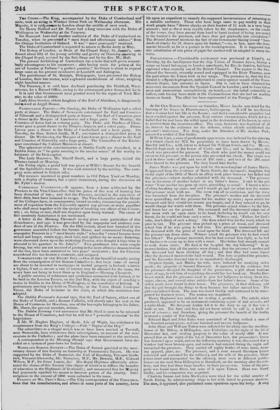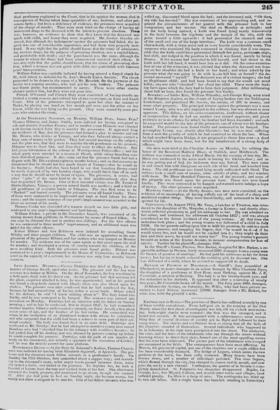At the OLD BAILEY SESSIONS 011 Saturday, Moses Jacobs waatried
for the
burning of his house in Phosnix-street, Soho-square. It will be recollected that a woman lost her life in the flames ; and that a considerable prejudice had been excited against the prisoner, from various circumstances which led to a belief that tie had been the wilful agent in the destruction of his house, in order to recover from the insurance-office. The case, however, was deprived of all its interest by the evidence for the defence, which clearly established the prisoner's innocence. The Jury, under the direction of Mr. Justice Park, returned a verdict of Not Guilty.
William Carr, a man of gentlemanly appearance, was indicted for the uttering, of a forged check for 971. 6s. purporting to have been drawn by Messrs. Barclay and Co., with intent to defraud Sir William Curtis and Co. Messrs. Barclay kept cash at the house of Curtis and Co.; and in November, this check was presented for payment. Tire clerk who paid the money could not swear to the prisoner as the person who presented the check. The check was raid in throe notes of 20l. and two of 101. each ; and two of the 201. notes were traced to the prisoner. The Jury found hint James Hailes was put upon his trial for the manslaughter of James Harris. It appeared front the evidence of Maria. Harris, the deceased's daughter, that on the night of the 10th of March an affray took place between her father and the prisoner,—whose mother cohabited with the deceased. "Tile prisoner was in the room of another lodger in my father's house. I said to the pri- soner Your mother has gone up stairs, grumbling as usual.' I heard a noise of china breaking up stairs, and said I would go and see what was the matter. The prisoner went with me. The room was all in confusion, and the stove was wrenched from the fire-place. The prisoner's mother and the deceived were quarrelling, and the prisoner led his mother up stairs ; upon which the deceased said they should not remain any longer, and if they refused to go, he would charge the watch with them. The prisoner seized witness by the hair, and threw her on the ground. She screamed, and the deceased came out of the room with an open razor in his hand, declaring he would cut his own throat, for he could not bear such a noise. Witness said, Father, for God's sake, don't think of such a thing: She then asked him for the razor, which he gave to her. The prisoner then picked up a piece of wood, and deceased asked him if he was going to kill him.• The prisoner immediately struck the deceased with the piece of wood upon the head. The deceased fell, and the prisoner ran down stairs. Witness asked the prisoner why he had struck her father ? The prisoner answered, that he had served him right, as he had no business to come up to hint with a razor. Her father had strength enough to walk down stairs. He died at the hospital the day following." It ap- peared further, that all the parties were drunk ; that the prisoner's mother and the deceased Ltd been drinking all day ; and that they had more liquor after the deceased received the fatal wound. The Jury acquitted the prisoner, and the Recorder directed him to be immediately discharged.
Stephen Sprott, and Martha his wife, were indicted for receiving stolen goods, the property of Samuel Harwood. It appeared by the evidence, that the prisoners decoyed the daughter of the prosecutor, a girl about fourteen years of age, to rob him of everything she could lay her hand on. Martha Har- wood stated, that the prisoners used to give her halfpence to bring them tea, sugar, cheese, and several other articles from her father's house. Some of the stolen goods were found in their house. The prisoners, in their defence, said that the girl brought the things to them because her hither starved her. The girl contradicted them. The man was found Guilty, and sentenced to be trans- ported for fourteen years. The woman was acquitted. Henry Hepburne was indicted for stealing a penknife. The article, when produced, appeared to lie an instrument containing a pair of nail scissors, and a knife-blade. Mr. Sergeant Arabin left it to the Jury to say if this was a knife or not. The Jury said they did not know which to call it, a knife or pair of scissors ; and therefore, giving the prisoner the benefit of the doubt, returned a verdict of Not Guilty. Edward Bazil and John Hales were convicted of having robbed a man of one hundred penny-pieces and one hundred and twenty halfpence. John Shaw and William Tutton were indicted for breaking, into the dwelling- house of Mr. 'Milton, at Hillingdon, near Uxbridge, on the night of the 2d of December last, and stealing property to the value of nearly :100/, It was proved that on the night of the 1st of December last, the prosecutor's house was fastened up as usual, and on the following morning it was discovered that a window had been broken open, and rolthers had entered during the night, and ransacked the premises. They carried off eighty bottles of wine. linen, wear- ing, apparel, plate, 6,:c. The prisoners, and a man named Burnham (since convicted and executed for the robbery), and the wife of the prisoner, Shaw (since tried and transported for the offence), were seen at different public- houses on the road from Hillingdon to Brentford, on the morning after the rob- bery, and they had three large bundles in their possession. Some of the pro- perty was found upon Shaw, but none of it upon Tutton. Shaw was found Guilty, and his companion was acquitted.
Charlotte Inman and John Macfeyden were tried for the wilful murder of Sarah Ewing, by administering drugs to her with intent to procure abortion. The man, it appeared, also performed some operation upou her body. A mei dical gentleman explained to the Court, that in his opinion the woman died in consequence of having taken large quantities of rue, henbane, and other poi- sonous herbs; but front a deficiency of evidence, the prisoners were acquitted of the charge of murder. They were next tried on the charge of having ad- ministered drugs to the deceased with the intent to procure abortion. Them was, however, no evidence to show that they knew that the deceased was quick with child, and hence they were acquitted. Mr. Justice Gaselee ob- served, that although the indictments' against the prisoners had failed, the in. quiry was one of considerable importance. and had been very properly insti- tuted. It was right that the public should know, that the crime of administer- ing noxious drugs, for the purpose of procuring abortion,. Was a capital felony, and punishable with death ; and the punishment was the same, although the woman to whom the drugs had been administered survived their effects. It was also right that the public should know, that the crime of procuring-abor- tion, where a woman was not quick with child, was punishable with fourteen years' transportation.
William Baker was capitally indicted for having uttered a forged check for eh, with intent to defraud the St. Ann's Benefit Union Society. The check purported to be drawn in the name of a Mr. Beswick, for the payment of the motley to a country member, who had got his arm broken. The prisoner was found guilty. but recommended to mercy. There were other similar e
charges against 'him, but they were not gone into.
Patrick O'Connel and Patrick Daly were convicted of having cruelly as- saulted a young woman, and robbed her of two sovereigns, in Lion and Lamb Court. One of the prisoners attempted to quiet her after the manner of Burke, by placing One hand 011 her mouth and nose, and the other on her throat, while she was lying on the ground. They were scared by some per- sous who entered the court.



















 Previous page
Previous page